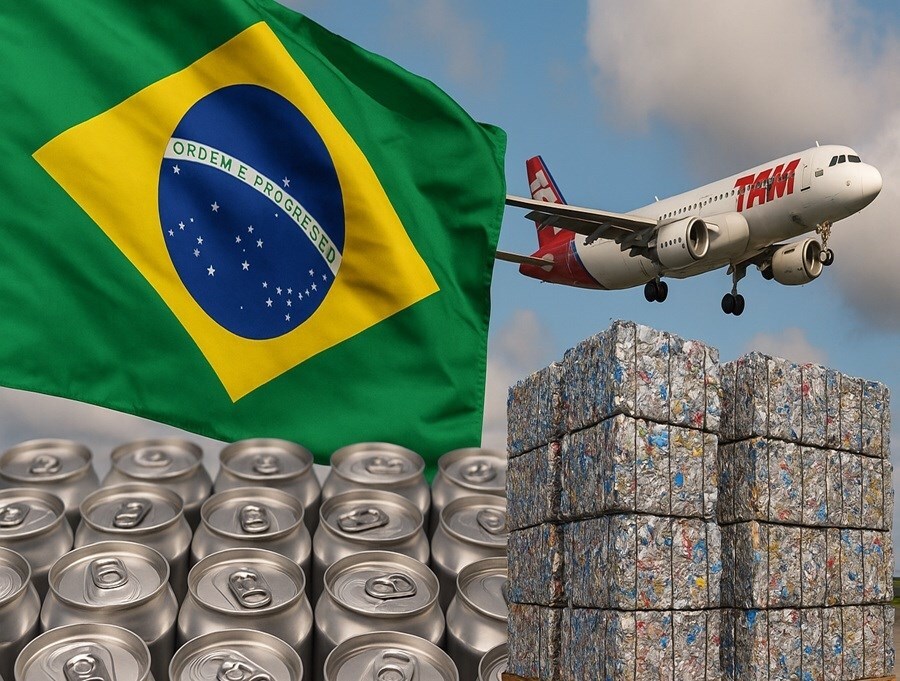

The Brazilian aluminium can industry has reaffirmed its strength in 2025, maintaining steady sales while continuing to lead the world in recycling performance. Despite a cooling market compared with last year’s record growth, the sector is pressing ahead with investments, industrial expansion, and a deep commitment to sustainability.

Stable sales in H1 2025
From January to June 2025, aluminium can sales in Brazil reached 16.5 billion units, the equivalent of around 6 billion liters of beverages, according to the Brazilian Aluminum Can Association (Abralatas). The result marks a 0.7 per cent rise compared with the same period last year. Though modest, the increase reflects the sector’s resilience after a historic performance in 2024.
Last year, Brazil sold 34.8 billion beverage cans, up 7.6 per cent from 32.3 billion in 2023, setting a national record. That momentum, however, has given way to caution in 2025. Colder winter weather in southern and southeastern states and broader market uncertainties are weighing on demand. Still, the industry expects results for the year to be broadly similar to 2024.
Demand driven by a growing economy
Cátilo Cândido, executive president of Abralatas, told AL Circle that Brazil’s robust economy and rising consumer purchasing power remain powerful drivers of can demand. With a GDP of USD 2.17 trillion and annual per capita consumption equivalent to 165 12-can packs, Brazil today represents the world’s fastest-growing aluminium can market.
In 2024, the country became the world’s third-largest aluminium can market. Sales rose by 12 per cent in the first half of that year compared with 2023, outpacing Abralatas’ 5 per cent growth target and highlighting the link between macroeconomic strength and rising consumption.
Investments and industry confidence
The industry is doubling down on its presence in Brazil. Companies are improving existing facilities and have announced new factories to meet demand. “Our industry continues to invest in Brazil, with constant improvements in industrial facilities and even the announcement of new factories. This reinforces our commitment to economic development, job and income generation, and the strengthening of the recycling chain,” said Cândido.
Such investments signal confidence that the can industry can maintain stability and sustainable growth even as market conditions fluctuate.
Sustainability at the core
Beyond volumes and sales, the sector is determined to hold onto its reputation as one of the world’s leaders in sustainability. In 2024, Brazil achieved a 97.3 per cent recycling rate for aluminium cans, extending a 15-year streak of keeping rates above 95 per cent. This performance places the country among the top global benchmarks for circular economy practices.
“The growth recorded in the first and second quarter, although moderate, shows that the aluminum can represents a different model of sustainable production,” Cândido said. “The recycling rates that Brazil achieves demonstrate that it is possible to reconcile industrial performance with environmental commitment – and this is a path that the sector will continue to follow with responsibility and innovation.”
Rising scrap exports and recycling dynamics
Yet, the recycling system also faces new challenges. According to UN Comtrade data, Brazil’s aluminium scrap exports — including used beverage cans (UBC) — surged by 64 per cent in 2024, climbing to 52,691 tonnes from 32,152 tonnes in 2023. That came after a 68 per cent year-on-year increase in 2023, when exports rose from 19,105 tonnes in 2022.
The rapid growth in exports may have contributed to the slight drop in recycling rates. Based on an average can weight of 14.9 grams, the 34.8 billion units sold in 2024 generated about 518,520 tonnes of remelted aluminium. By comparison, the 32.3 billion cans sold in 2023 produced an estimated 420,000 to 484,500 tonnes.
Even with this dip, Brazil remains a recycling hub. Strong infrastructure, industry partnerships, and the engagement of cooperatives and waste pickers underpin its system and sustain recycling levels far above most global averages.
Toward COP30 and global leadership
The industry’s environmental credentials will take on even greater prominence as Brazil prepares to host COP30 from November 10–21, 2025. For Cândido, the can industry has a clear message to deliver.
“The aluminum can is the most advanced example of large-scale circular economy in Brazil,” he said. “In a year like 2025, with COP30 taking place in our country, this result shows that Brazil has real solutions to offer — backed by data, social impact, and environmental commitment. This is a collective achievement for the entire sector, built on dialogue, innovation, and responsibility.”
To get more insights into Brazil's aluminium cans recycling market, read our report: World Recycled ALuminium Market Analysis Industry forecast to 2032
Responses








